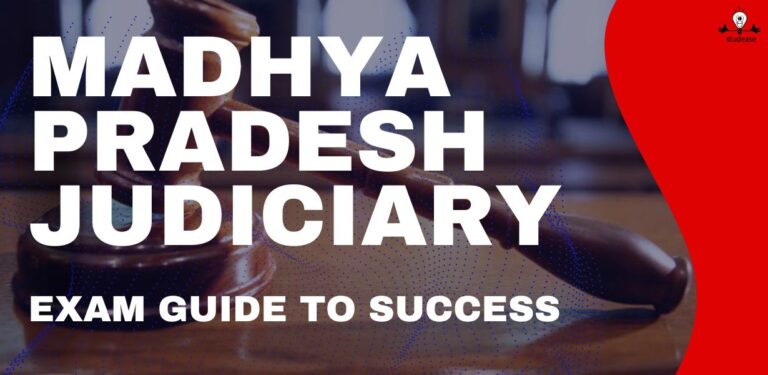Balancing Law School and Judiciary Exam Preparation: Tips and Strategies

Preparing for the judiciary exam while studying in law school can be a challenging task. It requires a lot of effort, time management, and focus to balance both the responsibilities effectively.
To begin with, it is essential to understand the importance of time management. You need to create a schedule that accommodates both your law school studies and judiciary exam preparation.
Allocate sufficient time for each subject, and make sure to stick to the schedule. Avoid procrastination and distractions, and prioritize your tasks accordingly.
Moreover, it is crucial to have a clear understanding of the exam format and study accordingly. While law school provides a strong foundation, the judiciary exam may require additional preparation. Therefore, it is recommended to create a study plan that covers all the necessary topics and materials required for the exam.
By balancing your law school studies and judiciary exam preparation effectively, you can achieve success in both areas. With proper time management, and hard work, you can excel in your law school studies and pass the judiciary exam with flying colors.
Understanding the Judiciary Exam

In this section, we will discuss the key subjects in the judiciary exam and what you need to know to succeed.
Key Subjects in Judiciary Exams
The syllabus for the judiciary exam is vast, and it covers a wide range of subjects. However, some subjects are more important than others, and you need to focus on them to score well. Here are some of the key subjects in the judiciary examination:
- Constitutional Law: This is one of the most important subjects in the judiciary exam. You need to have a good understanding of the Indian Constitution and its provisions to do well in this subject.
- Criminal Laws: This subject covers a wide range of topics, including the Indian Penal Code, Criminal Procedure Code, and Evidence Act. You need to have a good understanding of these laws to score well in this subject.
- Civil Laws: This subject covers the civil procedure code, transfer of property act, and other local laws. You need to have a good understanding of these laws to do well in this subject.
The exam pattern for the judiciary exam usually consists of multiple-choice questions, short answer questions, and essay questions. You need to be prepared for all types of questions to do well in the exam.
To be eligible for the Judiciary Exam, you need to have a law degree from a recognized university and meet other eligibility criteria.
You need to focus on the key subjects, understand the exam pattern, and meet the eligibility criteria to succeed.
Strategic Planning for Law School
When it comes to balancing law school and judiciary exam preparation, strategic planning is the key. By setting realistic goals, prioritizing legal knowledge, utilizing study material, and implementing time management techniques, you can optimize your study schedule and increase your chances of success.
Setting Realistic Goals
The first step in strategic planning for law school is to set realistic goals. This involves understanding your strengths and weaknesses, as well as the requirements of your course load and the judiciary exam.
By setting achievable goals, you can focus your efforts and avoid burnout.
Prioritizing Legal Knowledge
In order to succeed in law school, it is important to prioritize legal knowledge. This means focusing on the most important concepts and cases, and developing a deep understanding of the material.
By prioritizing legal knowledge, you can optimize your study time and avoid wasting energy on less important topics.
Utilizing Study Materials
Another key aspect of strategic planning for law school is utilizing study materials. This may include textbooks, casebooks, outlines, and study guides.
By choosing the right study materials and using them effectively, you can reinforce your understanding of legal concepts and improve your performance on exams.
Time Management Techniques
Effective time management is critical for balancing law school and judiciary exam preparation. This may involve creating a study schedule, breaking down tasks into manageable chunks, and avoiding distractions. By implementing time management techniques, you can make the most of your study time and avoid procrastination.
Practice with Mock Tests
Mock tests are an essential tool for preparing for the judiciary exam. By taking practice tests, you can identify areas of weakness and develop strategies for improving your performance. Mock tests can also help you become more comfortable with the format and content of the exam.
Regular Revision Techniques
Finally, regular revision is essential for retaining legal knowledge and preparing for exams. This may involve reviewing notes, creating flashcards, and summarizing key concepts.
By implementing regular revision techniques, you can reinforce your understanding of legal concepts and improve your performance on exams.
Balancing Exams and Law School

Here are some tips to help you integrate exam preparation with coursework, manage finals and judiciary exam preparation, and seek guidance from professors.
Integrating Exam Preparation with Coursework
One of the best ways to balance law school and judiciary exam preparation is to integrate exam preparation with your coursework. This means that you should try to focus on the topics that are likely to be covered in the exam while studying for your law school classes.
To integrate exam preparation with coursework, you can create a study schedule that includes both your law school classes and the judiciary exam topics.
You can also use study aids such as flashcards, outlines, and practice questions to help you review the material.
Managing Finals and Judiciary Exam Preparation
You can develop a study timetable that encompasses your law school finals and the judiciary exam to effectively manage your preparation for both.
Seeking Guidance from Professors
Professors can be a great resource when it comes to balancing law school and judiciary exam preparation. They can provide you with guidance on what to expect on the exam, how to prepare for it, and what to focus on. They can also provide you with feedback on your practice questions and outlines.
Remember, professors are there to help you succeed, so don’t hesitate to reach out to them when you need help.
By following these tips, you can balance law school and judiciary exam preparation and succeed in both areas. Remember to stay focused, stay organized, and seek help when you need it.
Enhancing Skills Beyond the Books
Preparing for the judiciary exam requires more than just studying textbooks. It is essential to develop skills beyond the books that will help you succeed in the legal profession. Here are two skills that you can develop to enhance your preparation for the judiciary exam.
Developing Public Speaking Abilities
As a lawyer, you will need to communicate effectively in court, and public speaking is a critical skill that you must develop. You can start by attending public speaking classes or joining a debate club. These activities will help you improve your communication skills and build your confidence. You can also practice your public speaking skills by participating in moot court competitions or by volunteering to speak at public events. By doing so, you will be able to hone your skills and gain valuable experience.
Staying Updated with Current Affairs
As a law student, it is essential to stay updated with current affairs, especially in the legal field. You can subscribe to legal newsletters or join legal forums to stay informed about the latest developments in the legal profession.
You can also read legal blogs or follow legal experts on social media to keep up with the latest legal news. By staying updated with current affairs, you will be able to develop a deeper understanding of the legal profession and stay ahead of the competition.
Thus, developing public speaking abilities and staying updated with current affairs are two skills that you must develop to enhance your preparation for the judiciary exam. By doing so, you will be able to improve your communication skills, gain valuable experience, and stay ahead of the competition.
Exam Resources and Support

Here are some resources and support options to help you prepare for your judiciary exam.
Online Resources and Law Reviews
Online resources and law reviews can be a valuable tool in preparing for your judiciary exam. There are several websites that provide online resources, including past exam papers, mock tests, and study materials. These resources can help you get a better understanding of the exam format and the type of questions asked.
Law reviews are also a great resource for exam preparation. They provide in-depth analysis of legal cases, which can help you understand the legal concepts and principles in a better way. You can find law reviews online or in your law school’s library.
Study Groups and Mentorship
Studying in a group can be an effective way to prepare for your judiciary exam. You can join a study group with your classmates or find one online. Studying in a group can help you stay motivated and focused, and you can also learn from your peers.
Mentorship is another great option for exam preparation. You can find a mentor who has already cleared the judiciary exam and seek guidance and advice from them. They can provide you with valuable insights and tips on how to prepare for the exam.
Remember, your GPA in law school is also an important factor in your overall preparation for the judiciary exam. Make sure you maintain a good GPA throughout your law school years, as it can help you secure a good position in the judiciary.
To excel, try to use online resources and law reviews to get a better understanding of the exam, join a study group or find a mentor, and maintain a good GPA to improve your chances of success.
Conclusion
In conclusion, Remember to prioritize your tasks, create a study schedule, and utilize study aids such as flashcards and practice exams. It is also important to take breaks and maintain a healthy work-life balance to avoid burnout.
By following these tips and strategies, you can achieve your goals and become a successful law student and future judiciary exam candidate. All the Best!






